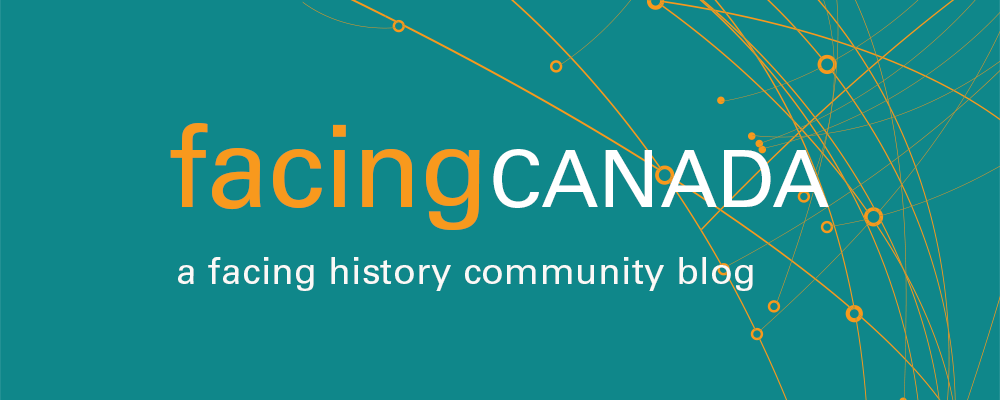Stories matter: They shape the way we see ourselves, the way we see others, and the way we understand history. By sharing and listening to stories, we recognize ourselves as part of the human story, as individuals who can change the narrative by making positive choices and shaping our world.
This spring, five groups of students in the Facing History and Ourselves elective course, Genocide and Crimes Against Humanity, explored the stories that matter to them and the issues important to their communities as part of a six-week digital media project called RadioZilla. In partnership with Regent Park Focus and funded by Mozilla Hive Community Projects through the Trillium Foundation, the project introduced digital media tools and storytelling techniques to students, who used the skills to explore Facing History themes of identity, membership, judgment, memory, legacy, and choosing to participate. In asking important questions on topics that ranged from religion to clothing, the students both found their voice and learned valuable skills to convey it.
These are their stories. Listen in, or share them in your class.
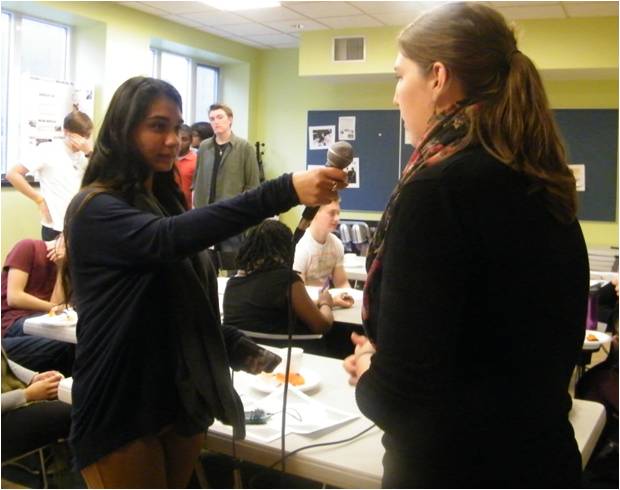
1. Questions of Religion
Listen as three students from Northern Secondary School explore the topic of religion and come to understand that the question of whether or not it is a force for social good is not as simple as they thought it was.
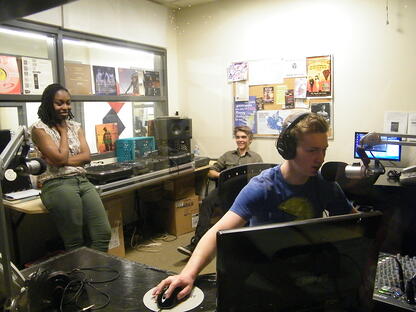
Students from Northern Secondary School working on their RadioZilla segment
Connection Questions
- How does religion influence the way the people in the audio define a community?
- How can you learn more about different faith systems in a secular setting? What skills and attitudes are necessary for discussing religion respectfully among classmates or outside your community?
- Can you identify some of the generalizations you hear in the interviews? What are the dangers of making generalizations about groups of people?
Looking for one more story? Read Eboo Patel's "Talking About Religion" in Stories of Identity: Religion, Migration, and Belonging in a Changing World.
2. The Life and Times of a (Canadian) Refugee
Inspired by the testimony of Holocaust survivor Nate Leipciger, students from Woburn Collegiate Institute investigate stories of the Canadian refugee experience.
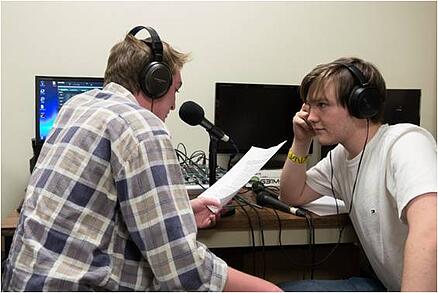
Students from Woburn Collegiate Institute recording their RadioZilla segment
Connection Questions:
- How do we celebrate the good that some people are doing to create change so as to inspire others, while also recognizing that there is more to be done?
- How does this story connect with or challenge your understanding of the refugee and immigration system in Canada?
- What are the opportunities and challenges associated with a country opening its doors to refugees? What proactive steps can individuals, organizations and institutions take to meet the challenges?
Learn more about Bill C 31, the Refugee Reform Bill, and the Sanctuary Network housing refugees mentioned in this segment, and take this discussion deeper into immigration issues using Stories of Identity: Religion, Migration, and Belonging in a Changing World, or consider deepening your discussion into the challenges of participating using reading five from our resource book Choosing to Participate.
3. Identity and the Clothing that People Wear
We all make judgments based on first impressions. But what do our clothes really say about who we are? These students from Marc Garneau Collegiate Institute delve into how much their identities shape what they wear.
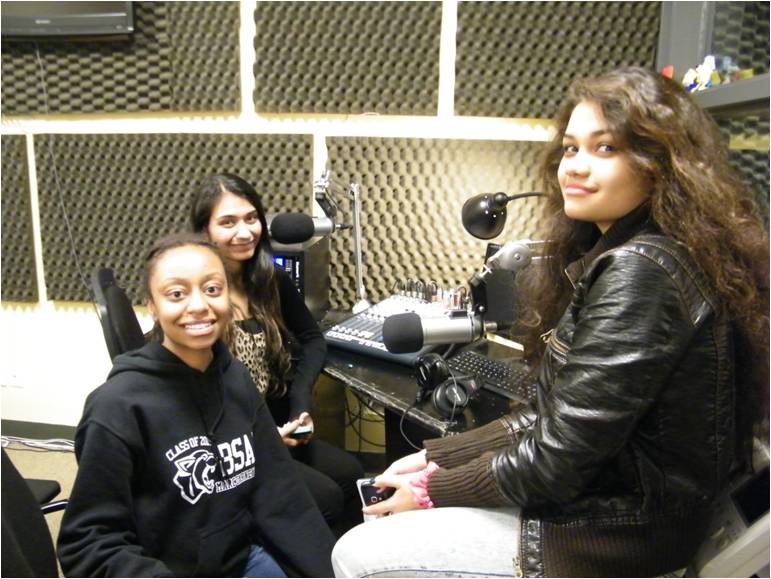
Students from Marc Garneau Collegiate Institute pause during their work on their RadioZilla segment
Connection Questions:
- What factors influence the clothing we wear? What factors should influence the clothing we wear?
- How do the clothes we wear affect the way that we see ourselves? How do the clothes others wear affect the way we see them?
- What assumptions do we make about the way others see us because of what we wear?
- How can we mitigate the unwanted pressures we feel on our clothing choices?
What if we could build safe schools where individuals could feel free to wear what they wanted to, when they wanted to? Learn more about how Facing History works to build safe schools.
4. Islamophobia
Four students from Marc Garneau Collegiate Institute question the dominant portrayal of Islam that they see on the news by exploring the way that the Islamic faith is expressed in their own neighbourhood.
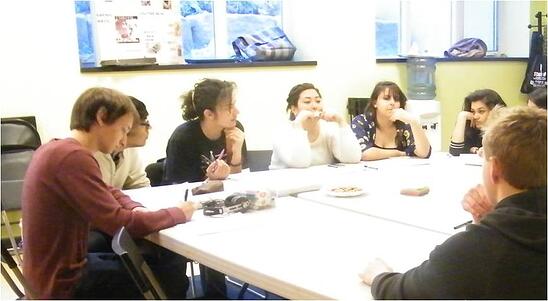
Students brainstorming during a round table session
Connection Questions:
- What role do assumptions, generalizations and stereotypes play in the creation of Islamophobia?
- What can we learn about all forms of discrimination by this examination of Islamophobia?
- How can we dispel myths and stereotypes we find in society?
In their interviews, the case of Quebec's ban on religious symbols enters the conversation. What could we learn from a case study on France's debate over headscarves in schools - What are the issues? What are the terms of discussion? How do we frame our conversations?
5. From Bystanders to Upstanders (originally posted here)
Three students from Harbord Collegiate Institute examine questions of human behaviour in motivating individuals to take action and choose to participate.
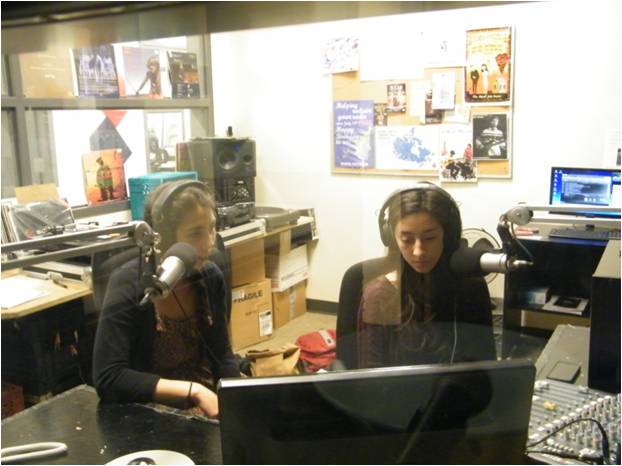
Connection Questions:
- What can be done to motivate people from inaction to action?
- What is the role of community in creating change? What constitutes community?
- In what ways can you choose to participate in bettering your community?
Learn about other theories of human behaviour in this reading in which New York Times reporter Nicholas Kristof refers to social science research about “the psychology of compassion” and explains how he applies this knowledge when writing about the genocide in Darfur.
If you are interested in using these resources in your classroom, contact Jasmine Wong.
